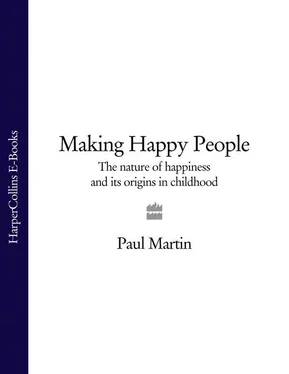PAUL MARTIN
Making Happy People
The Nature of Happiness and its Origins in Childhood

For Harriet, whose idea this was
Cover
Title Page
Dedication
ONE First things
The biggest issue
About this book
TWO What is happiness?
Heart and head
More than pleasure
How is happiness measured?
THREE Why does happiness matter?
Happiness breeds success
Happiness is good for your health
Is there anything bad about happiness?
Is there anything good about un happiness?
FOUR Where does happiness come from?
Happiness is (mostly) in the mind
The characteristics of happy people
Two pictures of happiness
The characteristics of very happy people
FIVE Being connected
Relationships rule, OK?
Trust
Social capitalism
Marriage
SIX Authentic ingredients
Geography
Genes
Health
Sleep and exercise
Education
Religion
Looking good
SEVEN Snares and delusions
Mindless pleasure
An easy life
Youth and sex
Intelligence
Empty self-esteem
Mindless optimism
Drugs
Quick fixes
EIGHT Wealth and celebrity
Money, money, money
The bitch-goddess celebrity
Why TV and advertising are bad for you
What governments could do
NINE The story so far
TEN The authoritative parent
All you need (to begin with) is love
Style with substance
The authoritative difference
Beyond authoritative parenting
ELEVEN Education, education
What is education for?
A lifelong love of learning
Obsessed with the measurable
Social and emotional development
Letting children play
Faster is not better
TWELVE Last things
Keep Reading
End notes
References
Index
Acknowledgements
About the Author
Praise
Also by the Author
Copyright
About the Publisher
What is more enviable than happiness?
BERTRAND RUSSELL, The Conquest of Happiness (1930)
This is the story of something we all want for ourselves and for our children, but which few of us are sure how to get. It is about the conditions that give rise to happy children who will grow up to become happy adults. Along the way, we will consider how happiness develops during the lifetime of each individual, and hence how parents and schools can help to make happy people.
Happiness is a notoriously elusive aspect of human existence, whose nature and origins have been debated throughout history. But one point on which almost everyone agrees is that happiness is a uniquely desirable commodity. In every culture where researchers have posed the question, the majority of people say they regard happiness as their ultimate goal in life. Most people rate happiness above money (even if privately many of them behave as though money really were their primary goal). According to research, many Americans believe that happy people are morally superior to unhappy people and more likely to go to heaven. America even enshrines the inalienable right to ‘life, liberty and the pursuit of happiness’ in its constitution.
The idea that happiness is the ultimate goal in life is reinforced by a simple argument which was set out more than two thousand years ago by the Greek philosopher Aristotle. He pointed out that no one ever seeks happiness as a means to something else. With the sole exception of happiness, everything we humans desire can be regarded as a means to some higher end – and that higher end is usually happiness. People chase after money, power, material possessions, beauty or fame because they believe – often mistakenly – that these will bring them happiness. But no one ever seeks happiness in the belief that it will bring them some even higher benefit. Therefore, Aristotle concluded, happiness must be the ultimate goal. 1
But what exactly is happiness, and how do you achieve it – if not for yourself, then at least for your children? Why are some people consistently much happier than others? Is it genetically encoded, or can you buy it? Why is happiness virtually ignored by the education system, economists and governments, as though it were irrelevant or faintly embarrassing? We all say we want children to be happy, but why is so little actually done to pursue this aim? How can parents and teachers help children to maximise their chances of being happy people, both in childhood and throughout adult life?
These are big questions that do not invite simple answers. The novelist Michael Frayn wrote that happiness is the sun at the centre of our conceptual planetary system, and is just as hard to look at directly. Fortunately, we now have science to help us. Within the fairly recent past, scientists have begun to gaze at happiness and they are formulating tentative answers to questions about its nature and causes. As we shall see, a fair amount can now be said about happiness that is based on verifiable evidence rather than folklore or opinion. Even so, plenty of popular myths persist, and we should knock these on the head before going any further.
One of the silliest myths is that actively pursuing happiness is the best way to lose it. According to fortune-cookie philosophy, happiness is like a cat: it will never come if you summon it, whereas if you ignore it you will soon find it jumping into your lap. So, if only we would stop thinking about it, happiness would spontaneously blossom within us. This notion seems to be widely believed, in that many people behave in their daily lives as though happiness cannot be actively cultivated. But it is wrong. There are plenty of things we can all do to make ourselves and our children happier – and the starting point is knowledge. Someone who has a basic understanding of the nature and causes of happiness is much better equipped to become happier and to help others become happier. Knowledge is power.
A related myth is that happiness is essentially a matter of blind chance, and we must wait for it to creep up on us. Indeed, the word itself reflects this notion: ‘happy’ is derived from the Old Norse word happ, meaning luck or good fortune. The scientific evidence points to a very different conclusion, however. Happiness does not just fall randomly out of the blue: we can discover where happiness comes from and we can encourage it.
A more up-to-date piece of folklore, which has a seductive whiff of pseudoscience about it, asserts that happiness is all in the genes. According to this version of reality, the setting of your personal ‘happiness thermostat’ was fixed at the moment you were conceived. Thus, if you were unlucky enough to draw the short genetic straw, then trying to make yourself happier would be as futile as trying to make yourself taller.
Again the science tells a different story. Genes do of course play crucial roles in the development of any human characteristic, and happiness is no exception. It is also true that a person’s overall level of happiness will tend to remain fairly stable over quite long periods of time. But there is no such thing as a ‘gene for happiness’, and no meaningful sense in which anyone’s happiness is fixed for life by their inherited DNA. Happiness resides in the mind, and we all have the capacity to make ourselves and our children happier (or unhappier) than we are now. As we shall see later, the basic building blocks of happiness are shaped by our experiences, attitudes and ways of thinking. Parents and schools therefore have a big impact on children’s chances of being happy people, and for reasons that have nothing directly to do with genes. The single biggest influence on happiness is something we all have the scope to influence for better or for worse – namely, our relationships with other people.
Читать дальше













